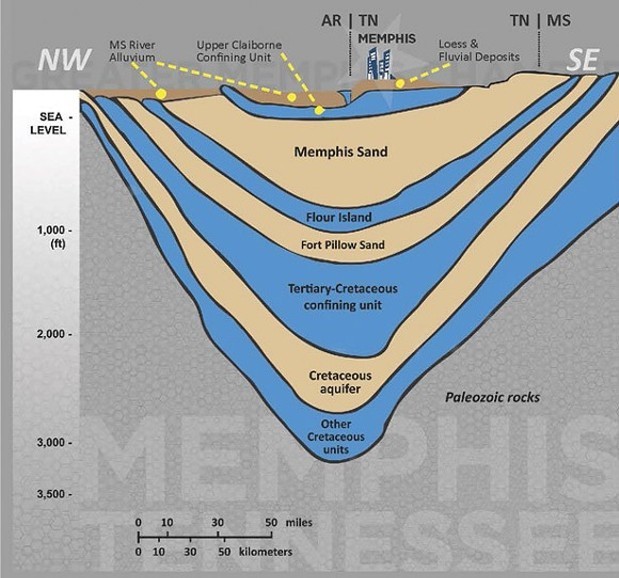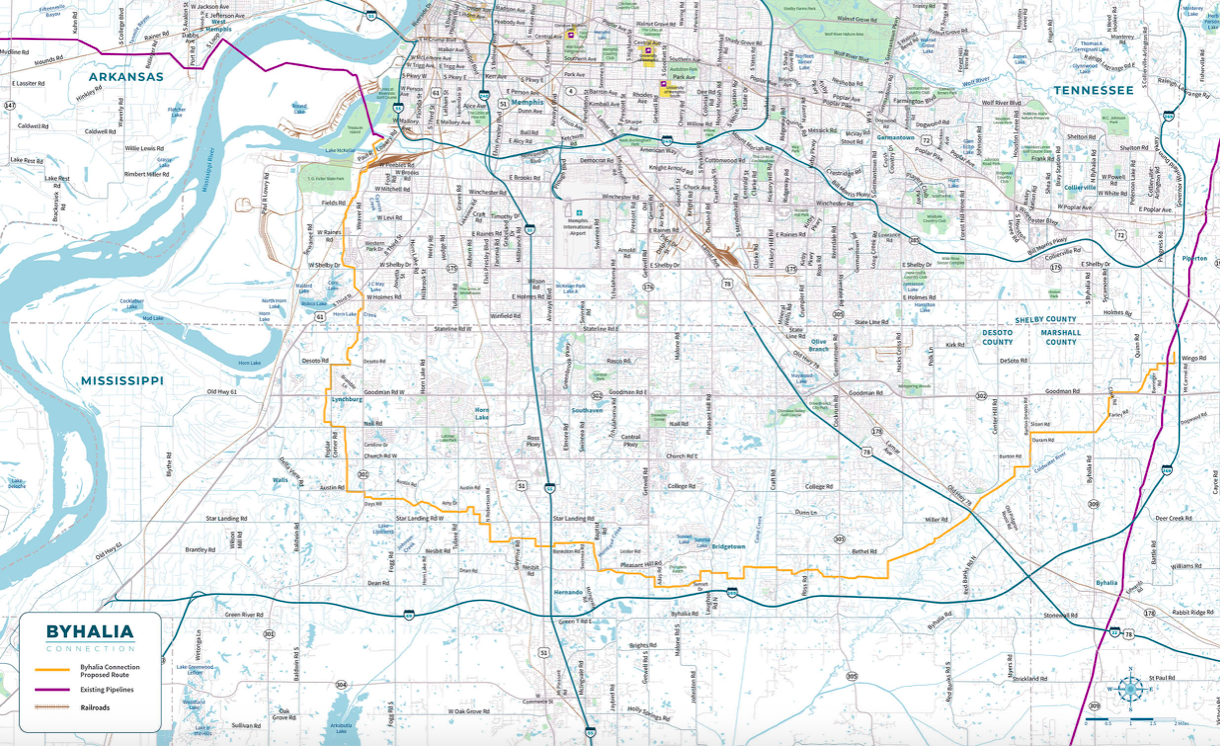 Corey Owens/Greater Memphis Chamber
Corey Owens/Greater Memphis Chamber
A diagram shows the layer of aquifers underneath Memphis.
Environmental advocates urged against a crude oil pipeline that they say will cut through several Black neighborhoods and could endanger drinking water.
Two companies began surveying here last year for a project to build a 49-mile pipeline from Memphis to Marshall County, Mississippi to connect to other crude-oil pipelines in the area. Plains All American Pipeline and Valero hope to begin work next year on the new Byhalia Connection Pipeline to bring more crude oil through Memphis to other places in the U.S.
A website for the project said the Byhalia Connection project is in the “pre-construction and easement acquisition phase of the project. We’re targeting to start construction in 2021 and be in service approximately nine months later.”
The plan was been questioned by Shelby County Schools (SCS), property owners along the proposed route, and by protestors last week.
On Friday, four local environmental groups asked the U.S. Army Corps of Engineers to deny the federal permit for the pipeline. The Southern Environmental Law Center (SELC), Protect Our Aquifer, Tennessee Chapter of the Sierra Club, and Memphis Community Against the Pipeline (MCAP) argued the “pipeline that would cut through several Black communities and the municipal wellfield that provides their drinking water, which is drawn from the Memphis Sand Aquifer.”
 byhaliaconnection.com
byhaliaconnection.com
The proposed Byhalia Connection would run through Black communities and across drinking water intake wells.
”We’re alarmed that — so far — no local, state, or federal agency is looking out for the groundwater that serves as Memphis’s drinking water,” said George Nolan, SELC senior attorney. “The nationwide permit the companies have applied for under the Clean Water Act states in very plain language that this type of permit does not allow for the construction of pipelines near drinking-water intakes, like the municipal well field it will run through.
[pullquote-1-center] ”If this oil pipeline leaks or spills, as many have done before, it could have devastating effects on the residents that live in southwest Memphis and their drinking water source.”
The groups argue that the pipeline would cut through many Black communities in southwest Memphis, including the Boxtown neighborhood. They claim that neighborhood is already “burdened” by dozens of industrial facilities. The area is home to the Valero oil refinery, Tennessee Valley Authority’s (TVA) shuttered, coal-burning Allen Fossil Plant, TVA’s gas-powered plant, and more.
“This resilient community, where many of our loved ones live and our ancestor’s bones rest, is being treated this way because of economic racism and environmental racism,” said Justin J. Pearson, a lead organizer of Memphis Community Against the Pipeline. “We care about the water that we drink, the land we live on, and the air we breathe, but too often our lives are deemed expendable by our own elected officials and company’s insatiable quest to profit off our very lives.”
[pullquote-2-center]
 Southern Environmental Law Center
Southern Environmental Law Center
This image shows how the pipeline would cut through a drinking-water well field in southwest Memphis.
The groups say that because the pipeline would cross wetlands and streams, it would have to get a permit from the U.S. Army Corps of Engineers under the Clean Water Act. While the companies are trying to get a permit, they’re asking for the wrong one, according to the groups, because of the pipeline’s proximity to a drinking water intake source.
The pipeline would cut through a drinking-water well field in southwest Memphis, operated by Memphis Light, Gas & Water. The wells there draw water from the Memphis Sand Aquifer, the famously clean source of the city’s drinking water. The wells in southwest Memphis supply drinking water to the primarily Black communities there.
“We think the Corps should consider the risks to our drinking water plus the environmental injustices this pipeline poses to residents,” said Jim Kovarik, Executive Director of Protect Our Aquifer. “This area of the Memphis Sand Aquifer is known to be vulnerable to contamination due to holes in its protective clay layer. In fact, there is a known breach in the Davis Well Field, near the pumping station. On top of that, the route is also near an earthquake fault line known as the New Madrid Seismic Zone. This is the wrong place for a pipeline.”